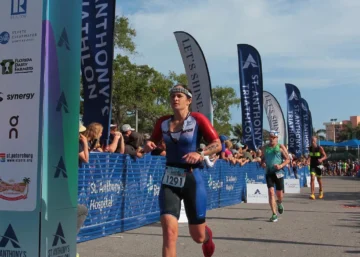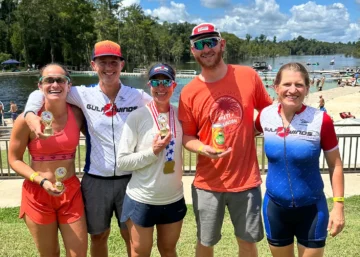
Last week’s post about setting achievable goals got me thinking about the type of goals we set as athletes. For example, there’s a difference between a process-oriented goal and an outcome-oriented goal.
An outcome goal might look like wanting to get on the podium, win your age group at a race, or qualify for a World Championship. An outcome goal focuses on the result you hope to achieve.
On the other hand, a process goal focuses on the steps you will need to take in order to achieve the outcome you want. Think of a process goal like a road map. Process goals are specific, usually short-term, and typically more achievable than outcome goals.
Both types of goals have their place (and the type you set depends somewhat on your personality and reason why you set goals in the first place) but a process goal is typically going to have a higher success rate. Here’s why.
Let’s say your outcome goal is to get on the podium at a certain race. The problem with that type of goal is that you can’t control most of the variables involved, such as the caliber of the other athletes who show up to the race and the performances of those competitors.
An outcome goal is what I call an “all or nothing” goal. You either achieve the end result or you don’t. Having a goal that’s reliant on too many factors outside of your control can easily lead to frustration and cause you to feel discouraged.
You can’t control the performance of other competitors; the one thing you can control is your own performance.
So a process goal would focus on the steps you need to take in order to achieve the end result you want. These might look like:
- Sticking with the front pack on the swim.
- Hitting your target heart rate ranges and power numbers on the bike.
- Nailing your nutrition strategy to prepare for the run.
It would be whatever is specific to you as an individual that will set you up to have the best race you can. But even if you do everything perfectly, you still might not end up on the podium. However, in this case, you will have achieved the process goals you’ve set for yourself, which builds self-confidence and skill mastery.
It also helps with motivation, because you feel a sense of accomplishment. That might inspire you to set bigger goals in the future which will get you closer toward achieving your outcome goal.
Another type of goal is a performance goal. This is very common among triathletes, who might want to achieve a certain bike split or run time during a race.
Personally, I do set this type of goal for myself. For example, I’d like to best my stand-alone, half marathon PR at the end of an Ironman 70.3 triathlon. This is something I’ve talked to my coach about, first to determine if it’s a reasonable and achievable goal.
And while it’s something good to focus on in order to direct my efforts, it’s not going to help me in day-to-day training. But process goals will!
For example, I’ve been doing an aerobic run block to improve and expand my heart rate ranges. Also, I focus on running drills for efficiency, strength work in the gym, hill repeats for muscular endurance, and intervals for speed. All of these smaller process goals will help set me up for success as I strive for my performance goal.
 You’ve probably heard the saying “trust the process” quite a lot. There’s a reason why it’s so popular. It works!
You’ve probably heard the saying “trust the process” quite a lot. There’s a reason why it’s so popular. It works!
If you don’t know where to start, begin with an outcome goal and then think about the steps you need to take to get to the end result you want. That’s the process goal or goals to focus on.
Hopefully, some of this is helpful for setting your own goals. But, let’s be clear. I’m not a coach, a sport psychologist, nor a goal-setting master. I am an athlete and have been one for my entire life: soccer, softball, tennis, karate, cheerleading, equestrian ect. While I wasn’t always the strongest/fastest/best, the one thing I’ve always been good at is the mental side of sports. Also, I love setting goals!
Since I’m a writer, I like to put my goals down on paper. I have three of these moleskin notebooks in my desk currently; they’re great for journaling too. And these Sakura Pigma micron pens are my favorite.
(This post includes Amazon affiliate links. If you make a purchase through one of them, I may get a commission at no additional cost to you.)
If you’re new here, I post on the blog on Tuesdays and Thursdays. Be sure to follow @bblife234 and @thetriplethreatlife on Instagram to find out when they’re live.


